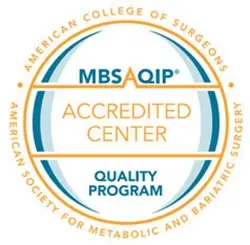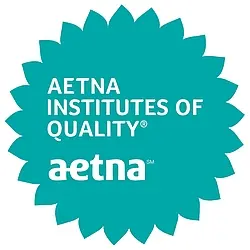The Presbyterian Bariatric Center
The Presbyterian Bariatric Center, a MBSAQIP Accredited Comprehensive Center, offers treatment of severe obesity (a body mass index, or BMI, of 35 or higher) and obesity-related health conditions through laparoscopic surgery by our bariatric surgeons. Our multidisciplinary team works with you to achieve healthy weight loss and improve your overall health. Our program will provide you with individualized nutritional, lifestyle and psychological support to help you achieve the success needed for a healthier life. We are proud of our MBSAQIP Comprehensive Center accreditation, as well as our designation as a member of the Optum/UnitedHealthcare Center of Excellence program.


Are you ready to start your surgical weight loss journey?
Services / Conditions Treated
Weight-related health issues such as:
Cardiomyopathy
Congestive heart failure (CHF)
Documented type 2 diabetes mellitus
Hypertension
Obesity-hypoventilation syndrome
Overweight, with body mass index (BMI) greater than 35
Previous myocardial infarction (also known as a heart attack) requiring hospitalization
Arthritis of the hip/knee which requires joint replacement
Obstructive sleep apnea on treatment with BiPAP or CPAP
Treatments / Tests Performed
Gastric bypass surgery
Loop duodenal switch/stomach intestinal pylorus sparing surgery (SIPS)
Sleeve gastrectomy surgery
Nutrition services
Psychological support
Our Providers
Our team includes bariatric surgeons and advanced practice clinicians, as well as nutritional and behavioral health support. Our clinic support staff include nurses and medical assistants. Our team will work closely with your primary care provider to help coordinate your care before, during and after participation in our program.
PMG Provider DirectoryCLINICS & FACILITIES
Bariatric Center in Rio Rancho at Rust Medical Center
FAQs & Patient Resources
Learn more about Presbyterian's Bariatric Center, different bariatric surgery options, and see answers to frequently asked questions and further patient resources.
The American Society for Metabolic and Bariatric Surgery (ASMBS) offers other helpful information and recommendations here: ASMBS Patient Learning Center
Patient Resources
Bariatric Center Accreditations
We are proud of our MBSAQIP Comprehensive Center accreditation, as well as our designation as a member of the Optum/UnitedHealthcare Center of Excellence program.

MBSAQIP Accredited Comprehensive Center: Presbyterian Bariatric Center received accreditation by the Metabolic and Bariatric Surgery Accreditation and Quality Improvement Program in 2016 (MBSAQIP) by successfully achieving a rigorous review process proving that we provide safe, top-quality surgical care and maintain standards of practice.
The MBSAQIP maintains a national registry of surgery outcomes, and provides ongoing clinical education for its members. Accreditation by this program promotes standard high-quality benchmarks for bariatric surgeons and supports continued education and improvements in surgical techniques for bariatric procedures. Annual compliance is verified by the MBSAQIP with a full on-site facility and program inspection every three years to maintain accreditation.

Aetna Institute of Quality: This program works to ensure that its bariatric program members fulfill five important benchmarks of quality: Experience, quality standards, support before and after surgery, efficiency of the facility, and accreditation by a national association. The Presbyterian Bariatric Center has met all of these benchmarks and in addition, have in place a quality improvement program for ongoing education and advancements in bariatric surgery, a quality follow-up program for all of their patients, and an organized aftercare program for a year following surgery to include medical and nutritional follow-up, as well as patient support and education.

Optum/UnitedHealthcare Center of Excellence: The Optum program also requires a level of high standards for a bariatric surgery program to participate. These standards include a higher level of successful procedures than other comparable programs, with high standards for specialty care. Presbyterian Bariatric Center undergoes an annual review of its surgical and aftercare practices in order to maintain good standing with this program.



